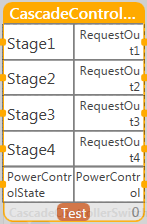Cascade Controller Switcher (v1.1)
Full Name
Lib.Mervis.v1_1.CascadeControllerSwitcher
Description
Auxiliary block used to enable the use of a combination of one modulated source and several non-regulatable sources with a cascade controller.
Required Project References
- Lib.Mervis
Usage in ST
program test
var
ccs: lib.mervis.v1_1.CascadeControllerSwitcher;
end_var
ccs();
end_program
Usage Examples
Description of Inputs and Outputs
| Inputs | Name | Data Type | Retain | Required Connection | Meaning |
| Stage1 | StageInfoType | No | Yes | Combined state of the modulated device | |
| Stage2 | StageInfoType | No | No | Combined state of the first non-modulatable device | |
| Stage3 | StageInfoType | No | No | Combined state of the second non-modulatable device | |
| Stage4 | StageInfoType | No | No | Combined state of the third non-modulatable device | |
| PowerControlState | CascadeSwitcherInfoType | No | No | Combined commands from the cascade controller |
| Outputs | Name | Data Type | Meaning |
| RequestOut1 | StageControlType | Combined demand for the modulated device | |
| RequestOut2 | StageControlType | Combined demand for the first non-modulatable device | |
| RequestOut3 | StageControlType | Combined demand for the second non-modulatable device | |
| RequestOut4 | StageControlType | Combined demand for the third non-modulatable device | |
| PowerControl | CascadeSwitcherControlType | Combined states for the cascade controller |
| Block Methods | Name | Meaning |
| Restart | Used to reset internal values and restart calculations |
Detailed Function Description
The block is a supplementary block to the cascade controller, so it is necessary to first understand its function.
This block allows continuous control of the cascade's performance, which consists of one modulated source and multiple non-modulatable (or sources with a limited number of stages). The block itself does not insert any additional control tasks, it only redirects the demand to the last source (the one being modulated) to the outputs RequestOut1 and similarly routes the state of Stage1 to the currently last source. The remaining sources are connected to the other outputs.
